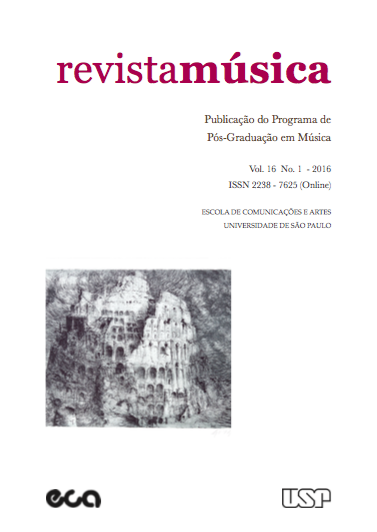Muses and Music in the Epistemic Horizons of Ancient Greece
DOI:
https://doi.org/10.11606/rm.v16i1.123173Keywords:
Music, memory, recollection, melos, orphism.Abstract
The study points the bold presence of memory in the episthemic questions of the ancient greek culture. Firts of all, it analyzes the presence of the goddess Mnemosyne and her daughters the Muses in the hesiodic myth and afterwards the mnemonic devices for the poetic competitions and recita-tions. Then presents the changes that ocurred with the inser-tion of philosophical discourses in the public debates. Then, it approaches the place of Mnemosyne in the orphic cults and the relationship between the pythagorean orphism and the platonismo. Finally, comments some aspects of the aristotelic text On memory and recollection observing analogies betwwen the aristotelic anamesis and the melos description in the aris-toxenian musical philosophy.Downloads
References
ARISTÓTELES. Περι μνημης και αναμνησεος / On memory and recollection. In: Parva naturalia. Cambridge: Harvard University Press, 1996. (Loeb Classical Library).
ARISTOXENO. Elementa harmonica. In: Rios, R. Da (Ed.) L’armonica. Roma: Typis Publicae Officinae Polygraphicae, 1954.
__________. The Harmonics. In: Macran, H. (Ed.) The harmonics of Aristoxenus. Hildesheim/New York: Georg Olms, 1974.
BURKERT, W. Antigos cultos de mistério. São Paulo, EDUSP, 1991.
FILOLAU. Sobre a natureza. In: Pré-socráticos. São Paulo: Abril Cultural, 1973, p. 255-58. (Coleção Os Pensadores).
GUSMÃO, Cynthia. A harmônica na Antiguidade grega. Dissertação (Mestrado em Filosofia). Faculdade de Filosofia, Letras e Ciências Humanas (FFLCH), Universidade de São Paulo (USP), São Paulo, 2010.
HAVELOCK, Eric. A revolução da escrita na Grécia. São Paulo: Unesp/Paz e Terra, 1994.
HERÁCLITO. Fragmentos. São Paulo: Abril Cultural, 1973, p. 79-97. (Coleção Os Pensadores).
HESÍODO. Os trabalhos e os dias. In: Amzalak, M.B. Hesíodo e o seu poema “Os trabalhos e os dias”. Lisboa: Academia das Ciências de Lisboa, 1947.
__________. Teogonia. In: Torrano, J. Teogonia de Hesíodo. Origem dos deuses. São Paulo: Iluminuras, 1995.
HOMERO. Ilíada. Tradução: Carlos Alberto Nunes. São Paulo: Ediouro, s.d.
__________. Odissea. Tradução: R.C. Onesti. Torino: Einaudi, 1989.
__________. Odisseia. Tradução: Jaime Bruna. São Paulo: Cultrix, 1997.
CASSOLA, Ferrandina. Inni omerici. Rocca San Casciano: Mondadori, 1997.
LÉVI-STRAUSS, Claude. La pensée sauvage. Paris: Plon, 1962. Lloyd, G.E.R. The revolutions of wisdom — studies in the claims and practice of ancient Greek science. Berkeley: University of California Press, 1987.
MAAS, Martha e Jane McIntosh Snyder. Stringed instruments in ancient Greece. New Haven/London: Yale University Press, 1989.
PARRY, Milman. The traditional epithet in Homer. In: The making of homeric verse. The collected papers of Milman Parry. New York: Oxford University Press, 1971. p. 1-23.
PLATÃO. La Repubblica. Lozza, G. (Ed.) Milano: Mondadori, 2006.
__________. Meno. London: Penguin Classics, 1956.
__________. Timaeus. In: Bury, R.G. Plato in twelve volumes.
Cambridge/London: Harvard University Press, 1989. (Loeb Classical Library, v. 9).
SORABJI, Richard. Aristotle on memory. Chicago: The University of Chicago Press, 2004.
OVÍDIO. Metamorfoses. Lisboa: Editora Cotovia, 2007.
Downloads
Published
Issue
Section
License
Copyright (c) 2016 Cynthia Gusmão

This work is licensed under a Creative Commons Attribution-NonCommercial-ShareAlike 4.0 International License.
Autores que publicam nesta revista concordam com os seguintes termos:
- Autores mantém os direitos autorais e concedem à revista o direito de primeira publicação, com o trabalho simultaneamente licenciado sob a CC Attribution-NonCommercial-ShareAlike 4.0 que permite o compartilhamento do trabalho com reconhecimento da autoria e publicação inicial nesta revista.
- Autores têm autorização para assumir contratos adicionais separadamente, para distribuição não-exclusiva da versão do trabalho publicada nesta revista (ex.: publicar em repositório institucional ou como capítulo de livro), com reconhecimento de autoria e publicação inicial nesta revista.
- Autores têm permissão e são estimulados a publicar e distribuir seu trabalho online (ex.: em repositórios institucionais ou na sua página pessoal) a qualquer ponto antes ou durante o processo editorial, já que isso pode gerar alterações produtivas, bem como aumentar o impacto e a citação do trabalho publicado (Veja O Efeito do Acesso Livre).


